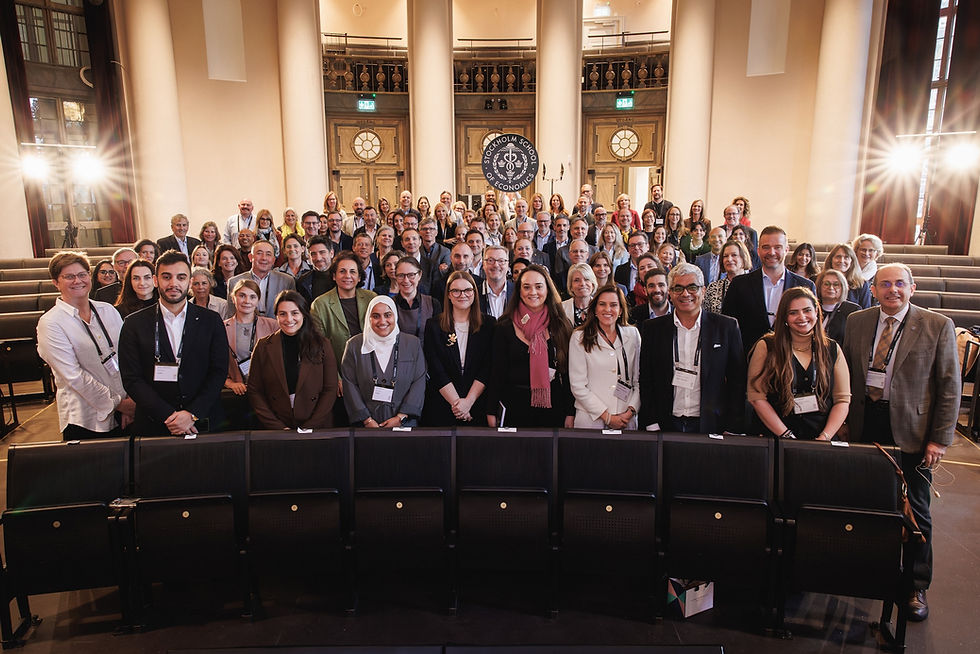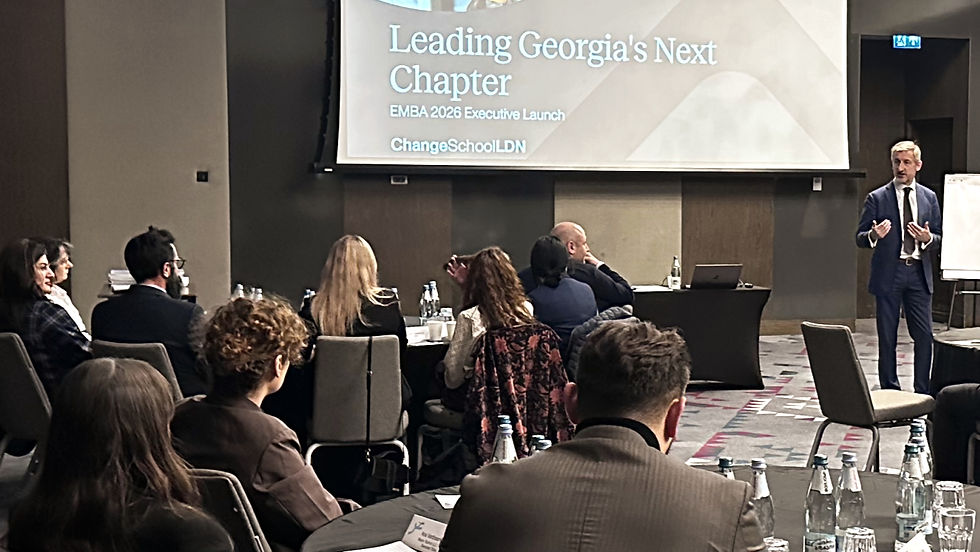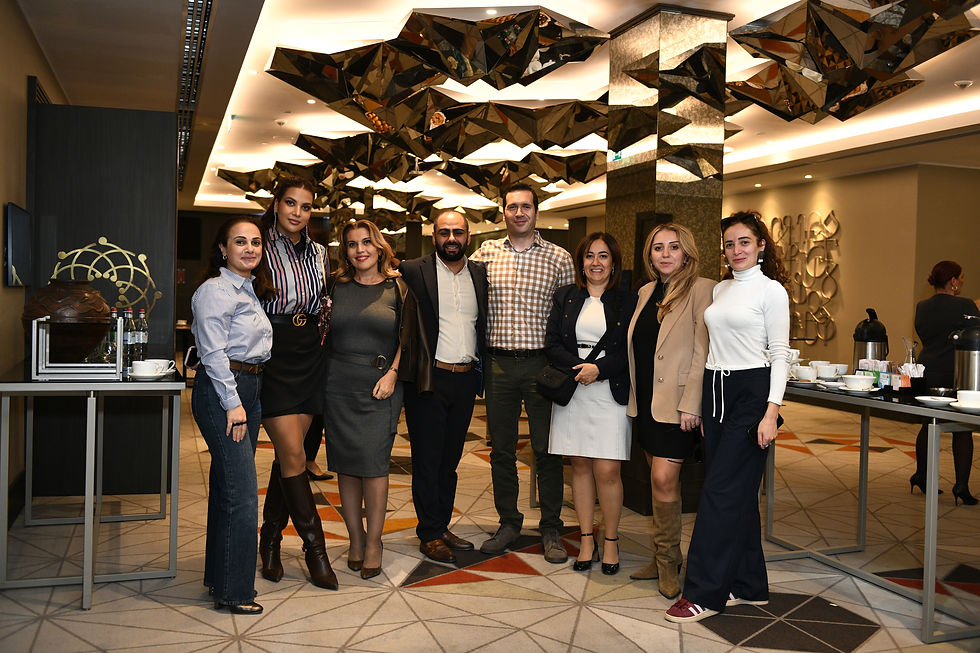Insights from EFMD Global 2025: What Makes Leadership Development Actually Work?
- Nov 5, 2025
- 5 min read
Updated: Nov 6, 2025
The question that keeps executives up at night is: why do some leadership programmes transform organisations while others have little impact?
At the EFMD Global Executive Development Conference in Stockholm this October, a clear answer emerged. It wasn't found in any single keynote or framework, but in the pattern across dozens of award-winning programmes from around the world. The answer is surprisingly simple: it's not the sophistication of the intervention that matters, but the quality of reflection it creates.
This insight comes at a crucial time. ChangeSchool London, working with King's Business School and the Education and Training Foundation (ETF), received the Excellence in Practice Silver Award at the conference for our work transforming leadership development in the UK further education sector.

The Challenge Facing Executive Education
Executive development faces real pressure. Organisations need results now. Transformation can't wait. Everyone wants the intervention that will deliver rapid change.
Yet this urgency often undermines the very transformation it seeks. We fill programmes with content, frameworks, and activities, leaving little space for the one thing that actually creates change: structured reflection on experience.
The Stockholm School of Economics, hosting this year's conference, framed the challenge well. In an age of artificial intelligence and information overload, the essential human abilities are consciousness, judgement, and empathy. These cannot be downloaded or transmitted through content alone. They develop through practice and reflection.
What Works: Three Approaches to Scale
Ten case studies at the conference demonstrated different paths to creating measurable impact. Each took a distinct approach, yet all shared a common thread: they built structured reflection into the heart of their design.
Starting at the Top
When Axpo Group and the University of St. Gallen wanted to transform their organisational culture, they began with their Executive Board. Rather than mandating change downwards, they placed leaders through the St. Gallen Organisational Feedback Process first.
At their management conference, 300 leaders watched a 50-piece orchestra perform under different conducting styles, experiencing directly how leadership approaches affect performance. The real innovation wasn't the metaphor, but what came next: coaching cycles, structured feedback, and values integration became central to performance systems, not just workshop topics.
In South Africa, The Principals Academy Trust partnered with the University of Cape Town's business school to treat principals in marginalised communities as the high-impact leaders they are. They combined executive-level business school training with coaching from retired principals. One principal used her learning to secure funding for a wall around her school, ending gang violence on the premises. Leadership capabilities translated directly into community transformation.
Building Capability at Scale
NatWest Bank and IMD took a different approach to transforming a 300-year-old institution. Rather than mandating culture change, they gave 160 leaders permission to test small hypotheses in their own contexts. These micro-experiments became their pathway to transformation, creating a cycle of continuous reflection on what worked and why. The insight: behavioural change drives cultural change, not the other way around.
Tata Group and London Business School designed their programme for 650 early-career professionals as a journey of exploration. Participants went on "Quests," filled their "backpacks" with insights, and regrouped at "Campfire." The metaphor shaped the actual learning architecture: experience, peer support, and continuous reflection replaced traditional content delivery. Several participants even became reverse mentors for their senior colleagues.
In a powerful demonstration of adaptive leadership, Credit Agricole Ukraine continued their leadership development programme throughout wartime. When sirens sounded and power failed, lessons moved to shelters. The programme taught resilience whilst embodying it, proving that leadership development can happen anywhere if the commitment to reflection remains strong.
Creating Movements for Change
BrightRock Life, a South African startup scaling from six founders to 450 employees, used storytelling to expand their culture. Instead of imposing values top-down, employees shaped the "Needs-Matched Way" by sharing stories of how they applied principles practically. Interactive workbooks, vision boards, and "pizza dialogues" transformed culture from a poster on the wall into a lived experience co-created by all.
Our own programme with the Education and Training Foundation and King's Business School sparked a movement in the UK further education sector, which was suffering from severe change fatigue. The innovation was uniting leaders at all levels to exchange ideas and reduce hierarchical gaps. Drop-in surgeries for peer-led problem solving, buddy groups meeting bi-monthly, and skill-building masterclasses fostered psychological safety in a sector that typically remains competitive.

The Pattern That Emerges
Look closely at these diverse programmes and a pattern appears. Axpo's coaching cycles. NatWest's experimentation journals. Tata's Chronicles and Campfires. The Ukrainian programme continuing through air raids. The South African principals' peer coaching. BrightRock's storytelling sessions. Our own drop-in surgeries and buddy groups.
Each provided structure, prompts, and peer support that helped people make meaning from experience. The orchestra created a powerful moment. The business challenges brought pressure. The war instilled urgency. The scale added complexity.
But it was the reflection afterwards, the structured time to process what had happened and why it mattered, that transformed experience into insight.
Why Reflection is Difficult to Scale
Incorporating genuine reflection into programmes at scale is challenging work. It requires resisting the temptation to fill every moment with content. It demands becoming comfortable with participants sitting with ambiguity or insights they're not yet prepared to express.
This goes against every instinct when facing pressure to deliver rapid results. Yet the evidence from these award-winning programmes is clear: transformation may need doing less, not more. Creating space where people can step back from action long enough to grasp what they're learning.
A New Language for Complexity
One particularly striking example came from Swedish public sector leadership development. Senior public servants were invited to write poetry about their work, their dilemmas, and their relationship with citizens.
When managers were allowed to express what they truly experience, not what the performance framework measures, something shifted. "Humanity is not weakness," one poem concluded. "It is strength in its purest form. It is to see the person behind the statistics."
This wasn't therapy masquerading as professional development. It was recognition that leaders operating in complexity need language for that complexity. Language that goes beyond key performance indicators and strategic priorities to name the tensions they actually navigate.
What This Means for Leaders and Organisations
The implications are significant. If quality of reflection drives transformation, then effective leadership development requires:
Structured space for processing experience. Not optional "reflection time" at the end, but integrated cycles throughout the learning journey.
Peer support mechanisms. Buddy groups, coaching partnerships, and communities of practice that continue beyond the programme itself.
Permission to sit with complexity. Comfort with ambiguity and questions that don't have immediate answers.
Multiple forms of expression. Not everyone processes through discussion. Some need writing, art, metaphor, or other creative methods to make meaning.
Connection to real work. Reflection without application remains abstract. Application without reflection remains reactive.
Building Resilience Through Reflection
Perhaps resilience in complexity means exactly this: not having all the answers, but cultivating the ability to sit with difficult questions long enough to find meaningful ones.
This aligns deeply with ChangeSchool's mission. We believe elite education is for everyone, but elite education isn't about exclusive access to content. It's about creating the conditions where genuine transformation becomes possible.
That requires bridging higher education, corporate innovation, and entrepreneurial development with approaches that work at scale whilst maintaining quality. It means building programmes that respect the intelligence and experience people bring, giving them frameworks and space to make their own meaning.

The recognition at EFMD validates this approach, but more importantly, it connects us with a global community of practitioners genuinely striving to create meaningful work. Practitioners who understand that transformation isn't about the complexity of intervention.
It's about the quality of reflection we facilitate. The rest is simply scaffolding.
ChangeSchool London, in partnership with King's Business School and the Education and Training Foundation, received the Excellence in Practice Silver Award at the EFMD Global Executive Development Conference 2025 for the Transformative Leadership Professional Development programme.
Be part of our growing community of innovators and leaders



